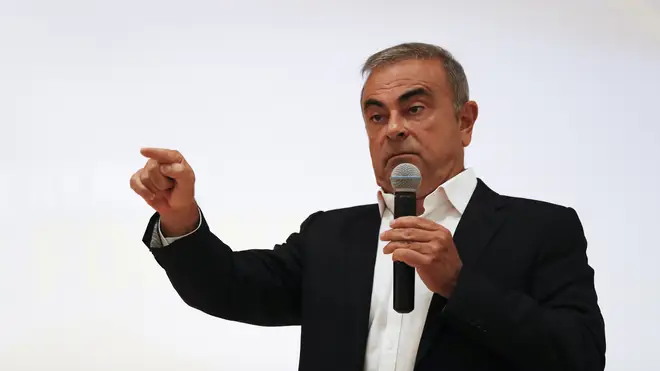
Ian Payne 4am - 7am
29 September 2020, 13:14

The former Nissan chief, wanted by Interpol, was smuggled from Japan in late December.
Former Nissan chairman Carlos Ghosn has made a new public appearance in Lebanon during which he launched an initiative with a local university to help the country which is undergoing a severe economic and financial crisis.
It is Ghosn’s second appearance in public since he was smuggled from Japan in late December to his ancestral Lebanon.
In early January, he gave a news conference in Beirut saying he fled Japan because he could not expect a fair trial on financial misconduct charges, was subjected to unfair conditions in detention and was barred from meeting his wife under his bail conditions.
He declined to elaborate about the details of his arrival in Lebanon, saying it happened in “dramatic circumstances”, and also refused to answer questions regarding two Americans who allegedly helped him flee Japan to Lebanon through Turkey. He also refused to talk about former Nissan executive Greg Kelly who is standing trial in Japan.
Ghosn said the new initiative with the Maronite Christian Holy Spirit University of Kaslik, titled Moving Forward, aims to launch a top executive management programme, a training centre for new technologies and to support start-ups.

“The objective is certainly serving this institution… but also serving the society and the country,” Ghosn said in an opening speech. “Lebanon needs to create jobs.”
“When we are developing top management, we are developing people strong enough to carry companies through this difficult time, to grow a company and to create jobs.”
Lebanon is mired in the country’s worst economic and financial crisis in its modern history.
It defaulted on paying back its debt for the first time in March, and the local currency has collapsed, leading to hyperinflation and soaring poverty and unemployment. Talks with the International Monetary Fund on a bailout package have stalled.
The economic and political crisis deepened after an August 4 blast in Beirut that killed and wounded many and caused damage worth billions of dollars.
Many Lebanese consider Ghosn as one of the country’s heroes who succeeded in turning troubled companies into profit-making ventures.
Some have suggested he should be given a governmental post in Lebanon to get a country notorious for corruption and mismanagement out of its troubles.
Since arriving in Lebanon, Ghosn has given interviews during which he repeatedly said he was innocent of allegations that he under-reported his future income and committed a breach of trust by diverting Nissan money for his personal gain.
He said one of the reasons there is no new foreign investment in Lebanon is because of the “lack of trust”, adding: “If you bring back trust, money will come. It’s not a problem.”
Ghosn was responding to a question about capital controls imposed by local lenders after the crisis began late last year and how to attract investments.
“We are here to help them, make sure that they are solid enough that they are ready for the bad surprises, for the unfair competition, for the malpractices for the heavy administration and still wanting to continue,” Ghosn said.
In January, Lebanon received an Interpol-issued wanted notice, which is a non-binding request to law enforcement agencies worldwide to locate and provisionally arrest a fugitive.
Lebanese authorities say Ghosn entered Lebanon on a valid passport, casting doubt on the possibility they would hand him over to Japan.
He was arrested in November 2018 and was expected to face trial in April this year. He posted 1.5 billion yen (£10 million) bail on two separate occasions after he was arrested a second time on additional charges, and released again.